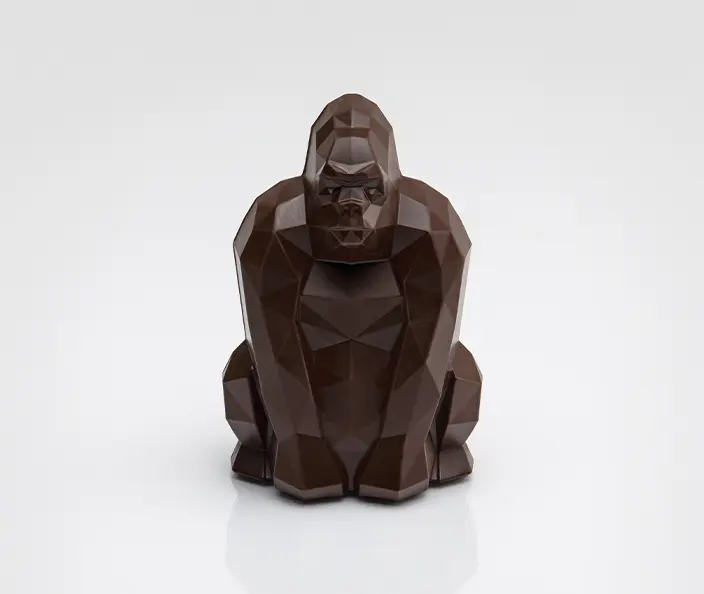The Angry Gorilla dark
Organic
Togo
The angry gorilla is our symbol for more justice in the cocoa industry. The cocoa for our gorilla comes from gebana Togo. The family-run company Stella Bernrain processes it for us in Switzerland. Vegan dark chocolate with 71 per cent cocoa content, the gorilla weighs 100 grams.
Please note:
Gorillas may have a so-called fat bloom, which makes their surface appear matte. This has no effect on their taste, but they longer look as good as they otherwise would. That is why we are offering them to you at a reduced price.
Best before 06.05.2025
Please note:
Gorillas may have a so-called fat bloom, which makes their surface appear matte. This has no effect on their taste, but they longer look as good as they otherwise would. That is why we are offering them to you at a reduced price.
Best before 06.05.2025
 Use & preparation
Use & preparation

| Nutrition table per 100g | |
|---|---|
| Energy | 2330kJ/556kcal |
| Fat | 41 g |
| thereof saturated fatty acids | 26 g |
| Carbohydrates | 32 g |
| thereof sugar | 28 g |
| Protein | 28 g |
| Salt | 0 g |
Ingredients: cocoa mass*, cane sugar*, cocoa butter*, vanilla pods*
*certified organic
cocoa solids: minimum 71%
Allergy information: May contain traces of hazelnuts, almonds, milk
*certified organic
cocoa solids: minimum 71%
Allergy information: May contain traces of hazelnuts, almonds, milk
Sustainability and supply chain
Producers
Grown by 2834 family farmers on an average of 1.5 ha in the Plateaux Region in Togo.
Cultivation
Organic, non-irrigated, manually harvested.
Processing
Manually sorted, sun dried.
Cocoa butter processed in Switzerland with cocoa beans from the Dominican Republic.
Cocoa butter processed in Switzerland with cocoa beans from the Dominican Republic.
Purchasing & Logistics
Purchasing from cooperatives and family farmers straight from the farm since 2000.
Transport: by lorry from decentralised warehouses to Lomé, by ship to Rotterdam, by lorry to Switzerland.
Transport: by lorry from decentralised warehouses to Lomé, by ship to Rotterdam, by lorry to Switzerland.
Background

Chocolate has a problem
Most people who produce cocoa don't earn enough to live on. They lack access to clean drinking water, medical care and education. To escape poverty, they clear woodland to create more arable land or use highly toxic pesticides. Some also put their children to work in the fields because they can't afford to hire harvest workers. It can't go on like this!

 Login
Login


